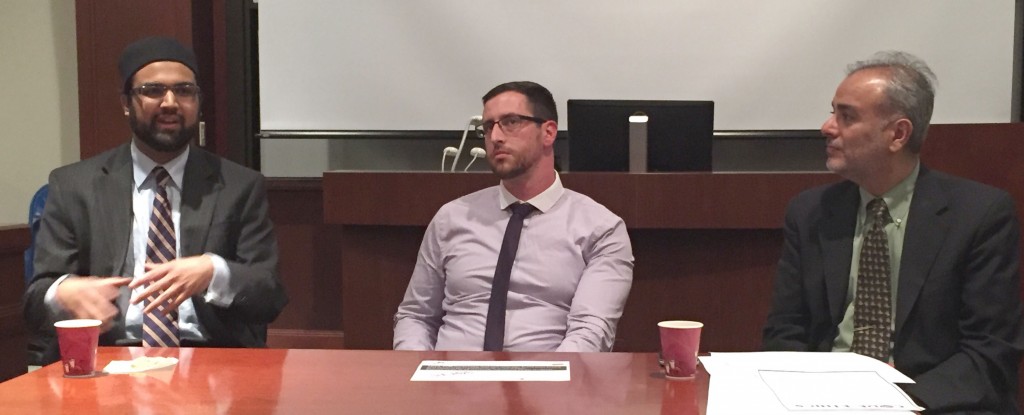Panel recap: Reporting on Islam

Imam Refai Arafin, left, makes a point during the panel discussion at Central Connecticut State University, while Andrew Ragali, center and M. Saud Anwar, right, listen | Paul Singley photo.
Words matter.
When the news media uses the word “terrorist” to identify the Muslim man in the Foot Hood attacks, but not the man involved in the Charleston church shooting, it adds to a growing negative sentiment toward Muslims, said M. Saud Anwar, former mayor and current council member in South Windsor.
Anwar was one of three panelists who spoke during a CTSPJ and CCSU SPJ panel discussion on Islam and Muslims in the news. Anwar was joined by Refai Arefin, Imam of the Islamic Association of Greater Hartford, and Andrew Ragali, a reporter with the Meriden Record Journal who handled much of the paper’s coverage of the November mosque shooting. The event was held Wednesday, Feb. 24 at Central Connecticut State University in New Britain.
“The words and descriptions are clearly different, even in similar incidents,” Anwar said, referring to an academic paper his son wrote that compared Washington Post media coverage of the two shootings.
A national conversation on Muslims in America has been ongoing, as many connect ISIS with the religion, which is practiced by about 3.3 million people in America, according to a 2105 Pew Research study. Fears increased in December, when a married couple killed 14 people in San Bernardino, California, and the shooters were identified as Muslims who supported ISIS. Shortly after, presidential candidate Donald Trump called for a ban on all Muslims entering the United States.
While the news media plays a role, Arefin said it’s “dangerous to talk about journalists as a monolith,” just as it’s not fair to paint all Muslims based on the actions of a few. That said, he sees some news media feeding into the fears of the public.
“The problem is the very nature of the news cycle today, in which the most extreme voices are amplified,” Arefin said.
Arefin said a selection bias leads to journalists covering mainly negative incidents with Muslims.
Ragali noted the pressures of daily news reporting and the shrinking staffs in newsrooms as part of the issue.
“We have to churn out a certain amount of stories every day. We have certain beats, so we cover city hall, education. So sometimes you’re stuck in that beat, and you can’t think broadly on certain things,” Ragali said. “So things like this, just talking, I’m getting story ideas right now.”
The video of the discussion will be posted in this space soon.
No comments yet
Comments are closed